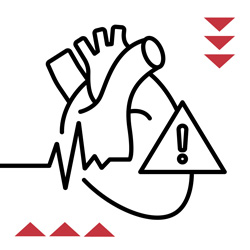
The term cardiovascular disease may sound like just one illness, but in reality, it refers to several conditions involving the heart and blood vessels.
Cardiovascular disease is the No. 1 cause of death for U.S. adults. That may be due, in part, to its serious risk factors—and the fact that it doesn't always cause obvious symptoms right away. Here's what you need to know.
Major types of cardiovascular disease
Atherosclerosis is the buildup of plaque inside the arteries. Plaque buildup narrows the arteries, which makes it harder for blood to flow through.
Heart attacks happen when blood flow to the heart is cut off by a blood clot. When blood doesn't get to parts of the heart muscle, those parts begin to die.
Heart failure does not mean your heart has stopped beating. Your heart is still working, but it isn't doing its job—pumping oxygenated blood throughout your body—as well as it should.
Heart valve disease is caused by valves that bulge, sag, or don't open or close properly. As a result, your blood doesn't flow through your heart normally.
Arrhythmia is an abnormal heart rhythm. It can be too fast (known as tachycardia), too slow (bradycardia) or irregular.
Arrhythmia affects your heart's blood-pumping ability.
Strokes can happen when blood flow to the brain is partly blocked or completely cut off, most often by blood clots. Without blood flow, brain cells begin to die. People who have strokes often lose some function, like talking, either temporarily or permanently.
Understanding your risk
Many factors can raise your risk for cardiovascular disease. Some factors you can't control, like your age, ethnicity or a family history of the disease. Other risk factors may be within your power to change, such as:
• Being obese or overweight.
• High blood pressure.
• High cholesterol.
• Diabetes.
• A diet high in saturated fat, cholesterol and sodium.
• Tobacco use.
• Excessive alcohol use.
• Lack of physical activity.
The good news is that by taking steps to change the risk factors you can control, you can do a lot to lower your risk and improve your cardiovascular health. To start:
• Exercise regularly.
• Eat a healthy diet.
• If you smoke, plan to quit.
• Understand the risks of alcohol.
• Control your blood sugar.
• Maintain healthy blood pressure and cholesterol levels.
Sources: American Heart Association; Centers for Disease Control and Prevention